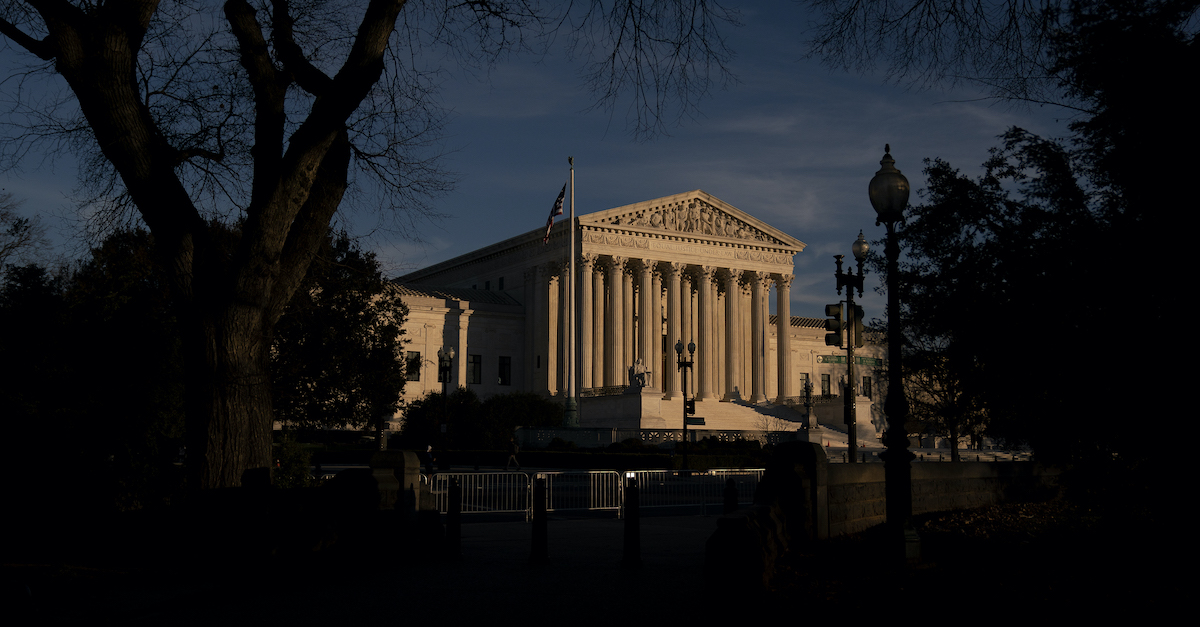
The U.S. Supreme Court’s recent efforts on behalf of aggrieved religious groups continued apace on Tuesday with a brief order striking down lower court rulings that did not touch Colorado’s COVID-19 restrictions on houses of worship.
The High Plains Harvest Church sued Colorado Governor Jared Polis (D) earlier this year over capacity limits on indoor gatherings which negatively impacted the small faith group’s ability to hold services.
Originally suing on a First Amendment claim, the church withdrew their original complaint after Chief Justice John Roberts‘ concurrence in South Bay United, which held that religious institutions incidentally challenged by neutral laws does not equate to a legally-cognizable slight under the First Amendment.
After the Minneapolis Police Department killing of George Floyd in late May, however, “spontaneous and volatile mass protests” erupted, in the words of the Colorado District Court. In turn, the tiny church in Ault, Colorado filed an amended complaint alleging that Polis “permitted and encouraged these protest gatherings while continuing to impose draconian restrictions on religious gatherings.”
In early December, the church filed an application for injunctive relief which, by the nature of court assignments, was delivered to Justice Neil Gorsuch. Gorsuch passed the motion along to the full court and the majority interpreted that filing as a “petition for a writ of certiorari before judgment,” granting the petition with zero discussion or analysis.
“The August 10 order of the United States District Court for the District of Colorado is vacated, and the case is remanded to the United States Court of Appeals for the Tenth Circuit with instructions to remand to the District Court for further consideration,” the unsigned opinion notes.
But it wasn’t Black Lives Matter protests–or Polis’s favorable treatment of those protests–which resulted in the evangelical church’s victory before the high court on Tuesday. Rather, it was the swift appointment of Justice Amy Coney Barrett to the bench.
In the Southbay decision, Roberts sided with the court’s more liberal members–notching one of his occasional, institutionally-focused victories against social conservatism in service of the broader conservative legal movement and the court’s own legitimacy. The vote in that case was 5-4, always a perilous proposition for staying power and, ultimately, Southbay was not long for this earth.
Barrett’s elevation quickly changed the calculus and, when the high court had the opportunity to strike down public health mandates in favor of religious primacy in late November, the court’s more conservative members were eager to oblige. In Roman Catholic Diocese of Brooklyn v. Cuomo, the court again issued a 5-4 opinion–this time with the balance swinging in favor of the borough’s Catholic Diocese and two Orthodox Jewish synagogues who complained that they were being singled out “for especially harsh treatment.”
The Harvest Church ruling is of a piece with a recent spate of similar actions from the Supreme Court in light of the Southbay repudiation. In early December, the court struck down California’s coronavirus restrictions–citing the hypocrisy of the Golden State’s Governor Gavin Newsom (D) dining indoors as part of its decision-making process. And, in a separate (and even shorter) order on Tuesday, New Jersey was also put on notice that their own restrictions affecting houses of worship are likely doomed as well.
Tuesday’s ruling is effectively little more than a procedural salve for uniform application of that late November ruling and won’t actually have any legal effect on worship in Colorado. That’s because the Centennial State has already lifted all COVID-19 restrictions on houses of worship--something the court was aware of when decided the case. But fallout is fallout and at least five justices apparently felt it was important to reiterate its point.
The court’s three liberals felt it prudent to point out the obvious here. Justice Elena Kagan authored a half-page dissent which was signed on to by Justices Stephen Breyer and Sonia Sotomayor.
The Kagan dissent notes:
I respectfully dissent because this case is moot. High Plains Harvest Church has sought to enjoin Colorado’s capacity limits on worship services. But Colorado has lifted all those limits. The state has explained that it took that action in response to this court’s recent decision in Roman Catholic Diocese of Brooklyn v. Cuomo. Absent our issuing different guidance, there is no reason to think Colorado will reverse course—and so no reason to think Harvest Church will again face capacity limits. When “subsequent events” thus show that a challenged action cannot “reasonably be expected to recur,” a case is well and truly over.
Roberts, for his part, was nowhere to be found in Harvest Church.
[image via Stefani Reynolds/Getty Images]